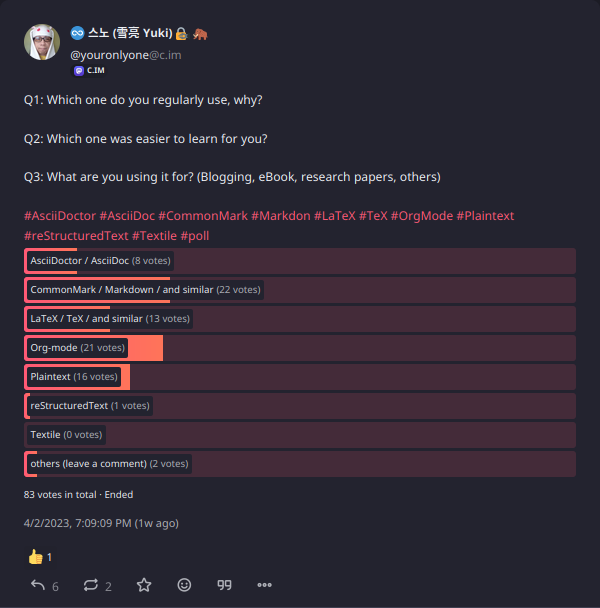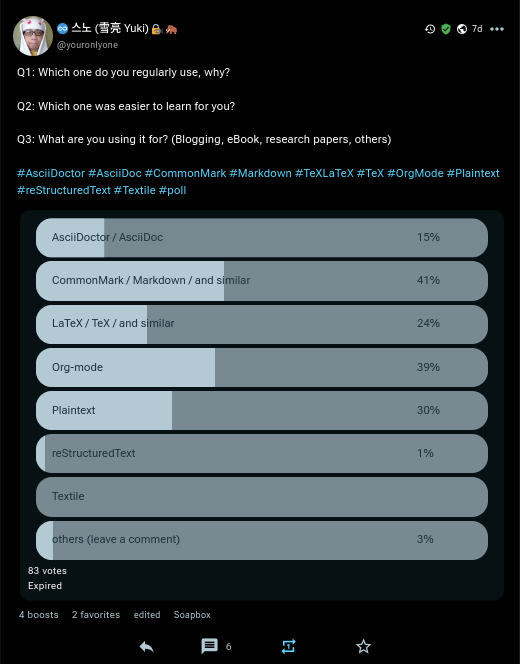I mostly use Markdown, but I have also been considering learning Org-mode. Other than Markdown, Org-mode, and good old plaintext—which is not a markup language per se—there are also AsciiDoc and LaTeX, to mention two. I was curious if it is worth learning a new markup language, and what other people use. Was it easy for them to learn a new markup language? Are they using it for writing research papers, blogging, emails, and taking down notes?
No better way to find out other than by making a poll and asking the fediverse community!
Polls
While online polls cannot provide conclusive results, it can still provide a general idea about a certain subject.
Meta
- Duration: 7 days
- Date: 2023-04-02 to 2023-04-09
- Total votes: 83
- Total voters: 53
- The poll
Results

Markup languages poll
Results as shown in the fediverse software, Calckey
To the extent possible under law, I'M YourOnly.One has waived all copyright and related or neighbouring rights to Markup languages poll. This work is published from Philippines.

Markup languages poll
Results as shown in the fediverse software Mastodon using a Trunks frontend
To the extent possible under law, I'M YourOnly.One has waived all copyright and related or neighbouring rights to Markup languages poll. This work is published from Philippines.
What are people saying?
For Fell’s thesis, LaTeX is the markup language of choice, but in all other cases, good old plaintext is more than enough because it is compatible with everything.
I’m using #texlatex for my #thesis but I try to stick to #plaintext in all other cases, simply because it’s compatible with everything.
I agree. Plaintext is plaintext. It is the easiest and fastest way to take down notes. You do not have to worry about converting a particular file from one markup language to another.
However, for Nick Anderson, Org-mode is life. Nick uses Org-mode for everything: knowledge management, writing email, blogging, presentations, tracking time, Jira ticketing, and more. Nick’s entire workflow and daily routine, you can guarantee Org-mode is there.
I’m using org-mode. The markup itself was not difficult at all, basics in no time but it’s a never ending process of tweaking my system and methodologies. https://cmdln.org/2023/03/13/reflecting-on-my-history-with-org-mode-in-2023/
I use it for everything, or as much as I can, including knowledge management, writing email, blogging, jira ticketing, presentations, encrypted secrets, tracking time and more. If I’m doing something (especially text oriented) it comes back and touches #emacs #orgmode in some way. https://cmdln.org/2023/03/25/how-i-org-in-2023/
I checked the articles Nick shared, and after going through Nick’s experience and process, I can imagine how it made Nick’s daily workflow faster and easier. This is a good thing, as I have mentioned I have been considering learning Org-mode and integrating it into my daily routine.
For Evan Keeton, the answers are LaTeX and Markdown markup languages. Evan shared that for anything mathematics related, LaTeX is the one to use. This is true, LaTeX is the choice in publishing scientific documents 1. If you plan to publish a research paper, it is a good idea to master LaTeX.
However, for things like note-taking, Evan said that Markdown fits perfectly. For Evan, Markdown is easy to read even without a proper renderer. I can attest to that. As a long-time Markdown user, my mind processes a Markdown document as if my brain is a Markdown renderer. It flows naturally, I do not have to consciously think about the markups in the document.
In undergrad, I’m only using two for a couple of different purposes:
#latex for anything mathematical-related, and many of my formal assignments in general (once you pick up basic formatting, it’s really easy to get started and make something nice)
#markdown for things more along the lines of notes. I use it in my personal life as well as taking notes for class, since it’s so easy to read even without a proper Markdown renderer
Potung Thul shares the same view as Fell, plaintext is the most compatible format of all the choices in the poll. Vim is also Potung’s go to cross-platform software for editing texts.
I have text on a variety of devices: desktop, laptop, smartphone I used plaintext because it is the most compatible between them.I use Vim on all of the devices.
Closing
From the above poll, while not conclusive, it gave a general overview on which format, or markup language, fediverse citizens use. The top two are: Markdown and Org-mode, followed by plaintext. While LaTeX is the de facto choice for scientific publications and in other fields 1.
I have heard good things about AsciiDoc, though it only received a few votes in this poll, it is a markup language that one should consider. It may be easier for you compared to the other popular choices.
Should you try one of these markup languages? Yes, you definitely should. Markdown is common in software development, for example, it is the markup language used by web repository services like Codeberg 2. It is also the default in many static-site generators like Hugo 3. There are also forum software which allow Markdown editing other than the old BBcode format.
And as was mentioned, LaTeX is the de facto standard in STEM (Science, Technology, Engineering, and Mathematics) publishing. Authors can submit their papers as a LaTeX document, and the publishers converts it to their own preferred format without losing any text information, like bold, italics, images, and footnotes. Compare that to submitting PDF, ODF, and DOCX documents, more likely than not the publisher will have to check if the conversion was accurate. Or, the authors of the paper have to spend more time on these things when they can better spend it doing research and experiments.
Of course, plaintext is as good as any. If presentation is not important, like bold and italics, plaintext can fill our everyday needs in documentation and note-taking. Even before the age of computers, that is what we were already doing… writing down in plaintext.
Links and more information
For more information about the various markup languages mentioned, check these useful links:
- LaTeX
- Org-mode
- Markdown: CommonMark
- AsciiDoctor
- AsciiDoc
- Wikipedia: List of document markup languages

